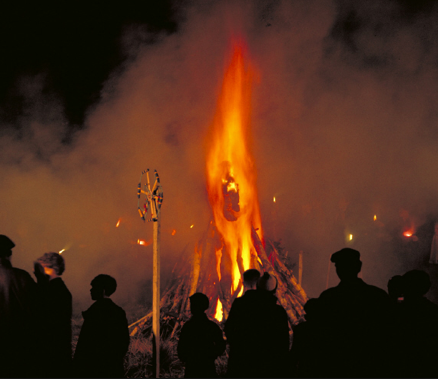While the men and lads were building the pile, a change took place in the mass of shade which denoted the distant landscape. Red suns and tufts of fire one by one began to arise, flecking the whole country round. They were the bonfires of other parishes and hamlets that were engaged in the same sort of commemoration. Perhaps as many as thirty bonfires could be counted within the whole bounds of the district.
It was as if these men and boys had suddenly dived into past ages, and fetched therefrom an hour and deed which had before been familiar with this spot. The ashes of the original British pyre which blazed from that summit lay fresh and undisturbed in the barrow beneath their tread. Festival fires to Thor and Woden had followed on the same ground and duly had their day. Indeed, it is pretty well known that such blazes as this the heathmen were now enjoying are rather the lineal descendants from jumbled Druidical rites and Saxon ceremonies than the invention of popular feeling about the Gunpowder Plot.
Moreover to light a fire is the instinctive and resistant act of man when, at the winter ingress, the curfew is sounded throughout Nature. It indicates a spontaneous, Promethean rebelliousness against that fiat that this recurrent season shall bring foul times, cold darkness, misery and death. Black chaos comes, and the fettered gods of the earth say, Let there be light.
Thomas Hardy set his beguiling The Return of the Native in his beloved Wessex, around Guy Fawkes Day.
Hardy's Bonfire on Egdon Heath and Eustacia Vye
Hardy wrote Return of the Native in 1878. I love that he focuses on the primal urges of the bonfire—the Lux Fiat against the darkness—as the heart of the tradition, and not the echoes of the Gunpowder Plot with its religious baggage.
I read The Return of the Native in high school, a novel well matched to that time and place. Wildeve, the heath, the bonfires, the odd, red Diggory Venn character, cross-dressing mummers, burning a foe in effigy, Hardy’s relentless themes of loneliness and isolation—does anything more clearly speak to the surging angst of high school?
And to top it off, I connected with the tortured, sad, exotic figure of Eustacia Vye, deemed by a chapter heading to be Queen of the Night. It’s hard not to read Hardy as mocking his heroine, but this was a serialized novel during Victorian times, and modern irony was still waiting just over the horizon in the No Man's Land of World War I:
"Eustacia Vye was the raw material of a divinity. On Olympus she would have done well with a little preparation. She had the passions and instincts which make a model goddess, that is, those which make not quite a model woman."
Hardy’s Tess has gotten the serious attention through the years, and we won’t even talk about the effect Jude the Obscure's Sue Bridehead and Father Time have had on subsequent literature.
But for me, Eustacia is the character that made me feel less lonely in high school, because she was so solitary.
She enters the story silhouetted against the Guy Fawkes bonfire:
"When the whole Egdon concourse had left the site of the bonfire to its accustomed loneliness, a closely wrapped female figure approached the barrow from that quarter of the heath in which the little fire lay.
Her reason for standing so dead still as the pivot of this circle of heath-country was just as obscure. Her extraordinary fixity, her conspicuous loneliness, her heedlessness of night, betokened among other things an utter absence of fear."
A tract of country unaltered from that sinister condition which made Caesar anxious every year to get clear of its glooms before the autumnal equinox . . . was not, on the face of it, friendly to women."
Hardy's language is a joy: "extraordinary fixity." It is astounding that he would write of a woman in terms of such strength—"utter absence of fear"—while understanding that such fearless independence can also be isolating. That was comforting to hear in high school.
Eustacia suffers from yearnings of grandeur: she is trapped by class and circumstance to live on the heath, which she detests, while she’s tormented by delusions of living in Paris. She yearns for love in an equally distraught way. Much of the book is overwrought passages about her comings and goings on the heath, as she walks between bonfires.
Yet, amid all the hype, I found a metaphor that seared into my teenage memory.
". . . a clue to her abstraction was afforded by a trivial incident. A bramble caught hold of her skirt, and checked her progress. Instead of putting it off and hastening along, she yielded herself up to the pull, and stood passively still. When she began to extricate herself it was by turning round and round, and so unwinding the prickly switch. She was in a desponding reverie."
Important lesson for women: beware the brambles of life because they will snag the hem of your dress if you are not careful. If you are not vigilant, they will keep you motionless, throw you into a desponding reverie, or worse. Clear them away, or at the least, walk around them.
Here's the rub: It’s not always easy to see these low-growing thorns, especially when your gaze is focused elsewhere than on your feet, like when looking up at a glorious sky or into the eyes of a beloved or at the bobbing head of a toddler. And that's when you can get ensnared . . .
But since high school, I have been on the outlook for those brambles. And it has helped. Thanks, Hardy.


